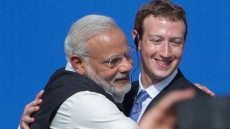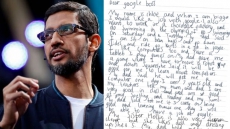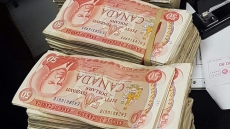TORONTO — Tyson Wiebe firmly believes the audio cassette hasn't been played out.
Many, many years after most music fans tossed their tapes in the trash, the Lethbridge, Alta., musician got behind the dated format in a big way — by forming an independent record label intent on resurrecting the once-loved cassette.
Through production runs of 100 copies, Wiebe hopes to convince more homegrown artists that releasing tapes makes sense in 2017. He sees it as a way for musicians to stand apart in the age of streaming music, and get more people to actually play a full album.
"It sounds great to us and it's a lot more inexpensive than doing something like vinyl," the founder of Norwegian Blue Records says.
"You go to any indie rock show right now, anybody worth their salt is starting to put a tape out."
As both physical and digital sales dwindled last year in Canada, sales of cassettes were surprisingly on the upswing.
About 7,000 tapes were bought in 2016, which represented a year-over-year spike of 79 per cent, according to Nielsen Music Canada. While it's not a huge volume, the figure was enough to give some in the music industry a shred of hope for a new revenue stream.
"When you're a touring band you need something that can get you to the next town," says Wiebe. "For us it's huge."
For some listeners, the lo-fi format never really died.
Punk and hardcore music fans, in particular, clung onto cassettes saying the format's audio hisses and distortion gave texture to songs.
But a few years ago, the cassette began to make its way beyond the fringes of the music scene.
Marvel's 2014 summer blockbuster "Guardians of the Galaxy" helped drag the tape back into the conversation with a soundtrack of classic rock hits that topped the charts. Helped by a special cassette release designed to look like a throwback mixtape, it became the top-selling tape in both 2015 and 2016 in the United States.
Whether people were actually listening to the tapes isn't so clear.
One of the biggest hurdles in embracing the cassette trend is finding a way to play them. Decades of decluttering have left many households without a good player. Few hung on to their Walkman, the smaller portable players that were once so commonplace.
Some bands question the merits of encouraging fans to go backwards to a technology that many listeners considered faulty in the first place. Cassettes were hindered by problems like wearing out, getting eaten by tape decks and melting in hot cars.
Vancouver rockers Japandroids raised an eyebrow when their former record label pushed out their albums "Post-Nothing" and "Celebration Rock" on tape.
"I think we both found it a bit baffling," admits drummer David Prowse.
But his bandmate Brian King fondly recalls some fans enjoying the initial novelty.
"People wanted them, or at least some people did," he says. "I'm not exactly sure ... if they're actually listening to them."
But Japandroids were never really committed to the cassette's revival and when they signed to Arts & Crafts for their latest album, manufacturing a tape wasn't even discussed as a possibility.
Other indie labels have seized the opportunity, including Toronto-based Dine Alone Records, which is one of the country's most enthusiastic tape supporters. Dozens of their artists have albums on tape, including City and Colour, the Sheepdogs and Alexisonfire.
Canadian indie musician Ty Trumbull experienced mixed results after buying into the early revival of tapes back in 2014. Looking to drive sales at his live shows, he says the low overhead costs made it easy to sell cassettes for an affordable $5 at the merchandise table.
He was confident that "Pull the Cork," the 2014 album with his band Scoop Trumbull & The Wrong Notes, would he a surefire hit. But sales were volatile depending on where in Canada he played.
"Toronto put a bit more value in kitsch things like that," he says.
"When you start touring out to New Brunswick there were less people interested ... you'd maybe sell one or two."
Whether there's enough interest to keep cassette popularity growing is still uncertain, and early signs suggest the upswing may already be losing stream.
Over the past two months, cassette sales hit a ceiling and haven't recovered. Sales volumes have dropped 33 per cent so far this year, with only 400 tapes sold across the country by the second week of February. That's about 200 fewer copies versus this time last year.
There's also a catch to the recent sales renaissance.
Like vinyl records, many cassettes are packaged with download codes that let anyone enjoy the music on their computer or phone.
Critics say that's falsely propped up the popularity of the format, and suggest that many tapes are just trendy, ironic bedroom decor for teenagers.
Tom Howie, half of Vancouver-raised electronic duo Bob Moses, isn't betting on tapes finding widespread popularity again.
"The resurgence of cassettes is solely an offshoot of hipster culture," he says.
"But it's a cool marketing strategy. Everyone wants something they can't get."




